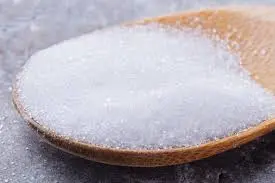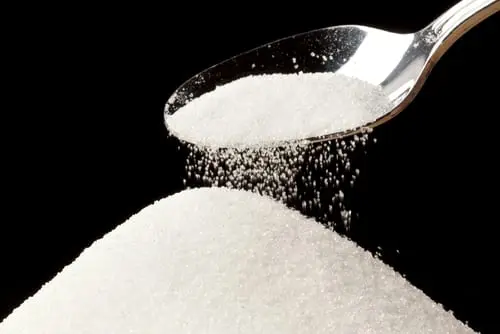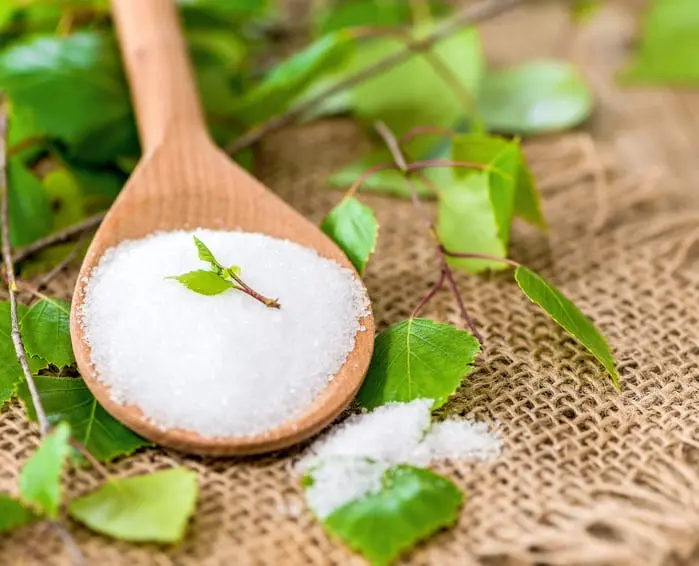Contents
As the sugar substitutes can be consumed in limited quantities we will tell you about some of the sweeteners and their properties.
Aspartame
Most often sold under the names “NutraSweet” or “Sancta”. In the list of ingredients identified by the code E951.
It was synthesized in 1965 from two amino acids that are present in any protein. Aspartame is 200 times sweeter than sugar, so in food production is used in small quantities.
This sweetener is never added to baked goods or foods that undergo heat treatment. But many soft drinks are made with it.
Permissible dose in a day – not more than 40 mg per kg of body weight. Is contraindicated in patients with phenylketonuria.
Saccharin

As a food additive is identified with a code Е954. Opened in the late nineteenth century.
Saccharin is widely used in medicine as a component of many drugs, since it has no calories and 98 percent is excreted by the kidneys unchanged. Therefore it is applied to the production of products for patients with diabetes.
Saccharin is 300-500 times sweeter than sugar, but has a specific bitter taste, so often mixed with cyclamate.
Permissible dose a day – 5 mg per kg of body weight.
Cyclamate

Cyclamate, Е952. It is the sweetener of the so-called old generation, which is synthesized in 1937.
It is most often used to correct the bitter taste of saccharin. Because it is only 30 times sweeter than regular sugar, it is mixed with saccharin in the proportion of 10 to 1.
However, studies have shown that intestinal microflora are capable of producing from cyclamates cyclohexamide substances that are potentially toxic.
In addition, products containing cyclamate, contraindicated during pregnancy because it can cross the placenta and affect the metabolism of the fetus.
Permissible dose per day – 11 mg per kg of body weight.
Acesulfame potassium

Also called acesulfame K, identified by the code Е950. This sweetener is sweeter than sugar 200 times, while resistant to heat treatment and does not lose its properties when boiled.
Е950 widely used in the manufacture of confectionery, soda and ice cream. This sweetener is not absorbed by the body and is completely excreted in the urine.
Permissible dose per day – 15 mg per kg of body weight.
Sucralose
Trichlorogalactosucrose or Е955. This is a very intense sweetener, which is 500-600 times sweeter than sugar.
It is resistant to high temperatures and acidic foods. It is considered absolutely safe for the human body.
Permissible dose per day – 15 mg per kg of body.
Stevia

One of the newest sweeteners and discussing. Isolated from the leaves of the stevia plant and, in 2008, allowed for the production of food products in the United States.
Stevia is 200-300 times sweeter than regular sugar and resistant to high temperature. Because it can be used in most types of food production and for pastry, and for sweetening beverages.
Permissible dose in a day – 2 mg per kg of body weight.
Sorbitol
E420. Made from vegetable raw materials and is itself contained in many fruits.
Its sweetness is three times lower than sugar, but not much less calories. Often used in the manufacture of medicines and chewing gum, tolerates boiling.
One of the most interesting properties of sorbitol – the ability to slow the growth of bacteria in the mouth and protect against tooth decay. However, when exceeding a daily dose of sorbitol – it may lead to a disorder of the bowel.
Permissible dose in a day – not more than 40 g.
Xylitol

Identified by the code E967. As sorbitol, is included in the composition of chewing gum and helps to protect teeth from decay. It is produced from corn and waste cotton production.
Xylitol is suitable for diabetic food, because its assimilation does not require the production of insulin. In large doses causes intestinal disorders.
Permissible dose in a day not more than 10 g.
Take note!
| Name | Calorie per gram | Taste regarding sugar | Safe daily dose |
| Natural sugar | 4 kcal | 1 | Up to 10 percent of calorie daily diet |
| Artificial substitutes | |||
| Acesulfame sodium | No calories, not metabolized | 200 | 15 mg on 1 kg of body weight |
| Aspartame | 4 kcal | 200 | 40 mg on 1 kg of body weight |
| Saccharin | No calories, not metabolized | 300-500 | 5 mg on 1 kg of body weight |
| Sucralose | No calories, not metabolized | 600 | 15 mg on 1 kg of body weight |
| Cyclamate | No calories, not metabolized | 30 | 11 mg on 1 kg of body weight |
| Natural substitutes | |||
| Stevia | No calories | 250-300 | 2 mg for 1 kg body |
| Xylitol | 4 | 1 | To 10 g for anyone |
| Sorbitol | 3,4 | 0,6 | To 40 g for anyone |









